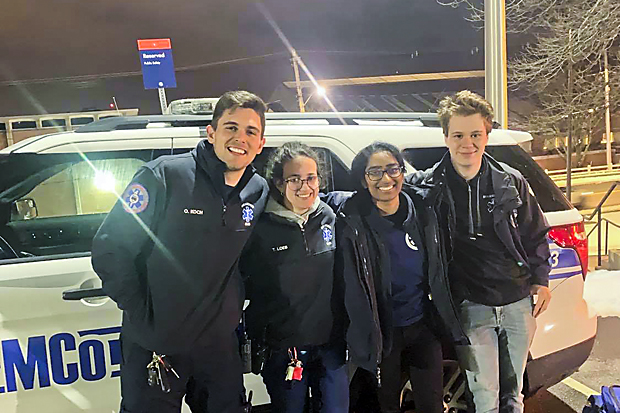The dedicated BEMCo crew combating coronavirus
 Photo/Michele Etzbach
Photo/Michele EtzbachOliver Koch, Talia Loeb, Reethy Sundar, Jack Beckerman
You likely know it by a two-syllable name — BEMCo — and you’ve undoubtedly seen its members responding to medical emergencies across campus at all hours of the day.
Since the Brandeis Emergency Medical Corps was established as a student-operated club in 1983, it has prided itself on the quality of care its members provide and their fast response time 24/7.
Even after the university ceased most on-campus operations in mid-March because of the coronavirus pandemic, BEMCo’s round-the-clock service continued throughout the spring semester.
“We started preparing for coronavirus in March and talked about making a collective decision about whether to stay in service if the university shut down,” said Ben Connally ’21, a biology major who serves BEMCo as a field supervisor and director of operations.
“We’re volunteers, so technically we didn’t have to stay,” Connally added. “But six of our crew chiefs and many of our corps members wanted to remain on campus and keep working.”
All BEMCo volunteers go through intense training, including CPR certification, and state and national EMT certification. Once they become full members, BEMCo staff respond to all kinds of campus medical emergencies and assist in off-campus efforts as well, including the 2013 Boston Marathon attacks and ongoing coronavirus relief.
BEMCo’s call volume on campus has been manageable, though Connally said he’s grateful he had the foresight to purchase a bulk order of N95 masks last semester.
He estimates BEMCo has about 70 members, though roughly 40 are active, meaning they’ve completed necessary training and have taken at least one 24-hour shift within the last semester.
Fifteen active members have remained on campus during the pandemic, and many took on part-time work as off-campus EMTs and contact tracers, in addition to their schoolwork.
David Bressler ’20, a neuroscience and biology double major, took up to two BEMCo shifts per week while working as many as 40 hours for a local ambulance company.
“The biggest thing is personal health and the way we think about cleanliness and disinfecting everything,” Bressler said. “You’re more mindful about what you’re touching and you make sure you wear personal protective equipment any time you’re interacting with someone.”
“My family will ask me about how sick people actually get from coronavirus — is it really as bad as it seems? A lot of people I interact with have severe symptoms, and others have none, but that doesn’t mean they’re not sick or can’t get sick,” Bressler added.
Oliver Koch ’20, a biology major and anthropology minor, works as a contact tracer in addition to his BEMCo shifts.
As a contact tracer, Koch calls individuals throughout Massachusetts who have been in close contact with people who have tested positive for coronavirus. On the calls, Koch also provides information about best practices for quarantining and verifies whether people have the necessary items to shelter in place.
“I really wanted to get involved and help with the COVID-19 response, so I reached out to EMS agencies in the area,” Koch said. “Unfortunately, no one was hiring and I felt kind of like a benched player.”
As it happened, professor Sarah Lamb sent out an email to all anthropology majors and minors informing them that Partners in Health was hiring contact tracers, and Koch signed up. “Since then, it’s been amazing for me to help a lot of people in these uncertain times, and it really has given me a deeper sense of community with the people in Massachusetts.”
Even though the BEMCo team is able to adequately respond to campus emergencies and assist with coronavirus relief efforts, they could still use more help.
“The good news is anyone who wants to, can join BEMCo,” said Michele Etzbach ’20, who majored in Health: Science, Society and Policy. “Normally, we have four people and two trucks on duty, so we can take two calls at the same time. It’s rare to get two calls at the same time, but it happens. And our response time from one side of campus to the other is 90 seconds.”
“One thing I’ve always really valued about my experience with BEMCo is how much the university trusts us and how we’re treated as part of Brandeis’ operations as whole,” added Etzbach, who has also been working part time as an EMT.
Even when students graduate, their BEMCo experience stays with them. A significant number of BEMCo alumni have become doctors or first-responders, or have joined law enforcement. Then there’s the camaraderie.
“It’s been a big part of my college career,” Bressler said. “I’m glad to be part of it and work with everyone on this team. They’re friends for life.”
Categories: Alumni, General, Student Life





